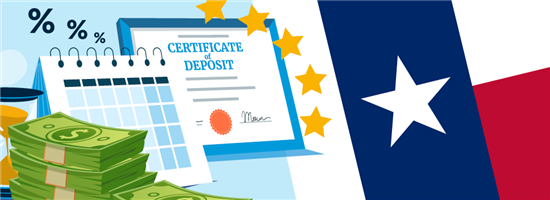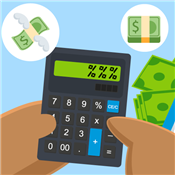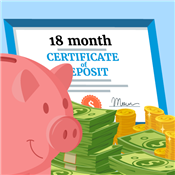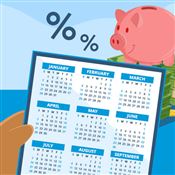Best CD Rates in Texas
Ad Disclosure: This article contains references to products from our partners. We may receive compensation if you apply or shop through links in our content. This compensation may impact how and where products appear on this site. You help support CreditDonkey by using our links.
Everything is bigger in Texas, including CD rates. Discover which banks have the best CD rates today.
 |
Here are some banks and credit unions with the best CD rates in Texas:
- mph.bank:
60-Month Callable CD - 4.32% APY - Freedom Bank:
6-Month High-Yield CD - 4.30% APY - Freedom Bank:
5-Month High-Yield CD - 4.30% APY - Bank Of Utah:
3-Month High-Yield CD - 4.30% APY - Freedom Bank:
4-Month High-Yield CD - 4.30% APY - Sallie Mae Bank:
14-Month No Penalty CD - 4.25% APY - Sallie Mae Bank:
27-Month High-Yield CD - 4.25% APY - UNCLE Credit Union:
36-Month Callable CD - 4.20% APY - SkyOne Federal Credit Union:
48-Month Callable CD - 4.15% APY - First Financial Northwest:
18-Month High-Yield CD - 4.15% APY - Together Credit Union:
12-Month CD - 4.60% APY - Texas Capital Bank:
6-Month CD - 4.50% APY - Ciera Bank:
3-Month CD - 4.30% APY - Texans Credit Union:
6-Month CD - 4.25% APY - City Credit Union:
6-Month CD - 4.25% APY - Eastman Credit Union:
6-Month CD - 4.25% APY - Citibank:
9-Month Fixed Rate CD - 4.25% APY - North Dallas Bank & Trust:
6-Month CD - 4.20% APY - Credit Union of Texas:
6-Month CD - 4.20% APY - University Federal Credit Union:
6-Month CD - 4.20% APY
Looking for a CD in proper Cowboy Country?
You might be spoiled for choice. Texas banks and credit unions offer some competitive CD rates with various terms. A CD with a good enough rate can set you with months or years worth of passive income.
Check out the highest CD rates in Texas today.
Best National Bank CD rates in Texas
If you're looking for a reputable large national bank, some offer decent CD rates from time to time. Check out these special rates for Texas residents:
- Charles Schwab Bank:
1-Year CD - Up to 4.40% APY - Fifth Third Bank:
3-Month CD - 4.26% APY - Citibank:
9-Month Fixed Rate CD - 4.25% APY - Wintrust Bank:
7-Month CD - 4.20% APY - Santander Bank:
6-Month CD - 4.15% APY - M&T Bank:
6-Month Select CD - 4.10% APY - Valley National Bank:
3-Month Fixed Rate CD - 4.10% APY - PNC Bank:
4-Month CD - 4.10% APY - Huntington:
5-Month CD - 4.08% APY - Rockland Trust Bank:
6-Month CD - 4.00% APY
Best Local Bank CD rates in Texas
If you prefer getting a CD with a local Texas bank, here are some of the highest CD rates you can consider:
- Texas Capital Bank:
6-Month CD - 4.50% APY - Ciera Bank:
3-Month CD - 4.30% APY - Citibank:
9-Month Fixed Rate CD - 4.25% APY - North Dallas Bank & Trust:
6-Month CD - 4.20% APY - Credit Union of Texas:
6-Month CD - 4.20% APY - First Foundation Bank:
4-Month CD - 4.15% APY - Susser Bank:
6-Month CD - 4.10% APY - PNC Bank:
4-Month CD - 4.10% APY - Armed Forces Bank:
9-Month CD - 4.05% APY - Amarillo National Bank:
3-Month CD - 4.00% APY
Best Credit Union CD rates in Texas
Credit unions can offer very competitive rates and other perks to their members. Check out these credit unions in Texas with impressive CD rates:
- Together Credit Union:
12-Month CD - 4.60% APY - Texans Credit Union:
6-Month CD - 4.25% APY - City Credit Union:
6-Month CD - 4.25% APY - Eastman Credit Union:
6-Month CD - 4.25% APY - University Federal Credit Union:
6-Month CD - 4.20% APY - Credit Human Federal Credit Union:
60-Month CD - 4.15% APY - Neighborhood Credit Union:
6-Month CD - 4.00% APY - Delta Community Credit Union:
12-Month CD - 4.00% APY - Randolph-Brooks Federal Credit Union:
18-Month CD - 3.95% APY - ALLIANCE Credit Union:
9-Month CD - 3.89% APY
Best Online CD rates in Texas
Online banks are typically available to residents nationwide regardless of where you live. Here are the top online CDs available:
- Marcus:
14-Month High-Yield CD - 4.50% APY - Bask Bank:
3-Month CD - 4.50% APY - My eBanc:
6-Month CD - 4.40% APY - Popular Direct:
3-Month CD - 4.40% APY - Synchrony Bank:
16-Month CD - 4.40% APY - Sallie Mae Bank:
15-Month CD - 4.35% APY - Limelight Bank:
6-Month CD - 4.35% APY - mph.bank:
60-Month Callable CD - 4.32% APY - Walpole Co-operative Bank:
7-Month CD - 4.25% APY - First Internet Bank:
12-Month CD - 4.20% APY
Best Jumbo CD Rates in Texas
Have a substantial amount to save? Jumbo CDs may offer higher rates compared to standard CDs. But they typically require a minimum deposit of $100,000 or more.
Here are the top Jumbo CDs:
- Alliant Credit Union:
6-Month Jumbo CD - 4.10% APY - Alliant Credit Union:
12-Month Jumbo CD - 4.05% APY - Alliant Credit Union:
18-Month Jumbo CD - 3.85% APY - Alliant Credit Union:
3-Year Jumbo CD - 3.75% APY - Alliant Credit Union:
5-Year Jumbo CD - 3.70% APY
It's smart to compare both regular CDs and Jumbo CDs. Even if you have over $100k to save, it's not always necessary to choose a Jumbo CD if a regular CD fits your goals.
Yes. Like standard CDs, your deposits in Jumbo CDs are federally insured up to $250,000 by the FDIC for banks and NCUA for credit unions.
Best CD Rates in Texas by Term
Looking to open a CD with a specific term? Here are some of the highest CD rates in Texas by CD term:
Best 3-month CDs in Texas:
- Texas Capital Bank:
3-Month CD - 4.45% APY - Ciera Bank:
3-Month CD - 4.30% APY - Eastman Credit Union:
3-Month CD - 4.25% APY - Susser Bank:
3-Month CD - 4.10% APY - Texans Credit Union:
3-Month CD - 4.00% APY
Best 6-month CDs in Texas:
- Texas Capital Bank:
6-Month CD - 4.50% APY - Texans Credit Union:
6-Month CD - 4.25% APY - Ciera Bank:
6-Month CD - 4.25% APY - City Credit Union:
6-Month CD - 4.25% APY - Eastman Credit Union:
6-Month CD - 4.25% APY
Best 1-year CDs in Texas:
- Together Credit Union:
12-Month CD - 4.60% APY - Texas Capital Bank:
12-Month CD - 4.40% APY - Texans Credit Union:
12-Month CD - 4.25% APY - Eastman Credit Union:
1-Year CD - 4.25% APY - Ciera Bank:
12-Month CD - 4.20% APY
Best 2-year CDs in Texas:
- Ciera Bank:
24-Month CD - 4.10% APY - Eastman Credit Union:
2-Year CD - 4.00% APY - Credit Human Federal Credit Union:
24-Month CD - 4.00% APY - Credit Union of Texas:
24-Month CD - 3.80% APY - University Federal Credit Union:
24-Month CD - 3.80% APY
Best 5-year CDs in Texas:
- Credit Human Federal Credit Union:
60-Month CD - 4.15% APY - Eastman Credit Union:
5-Year CD - 4.00% APY - University Federal Credit Union:
60-Month CD - 3.75% APY - Credit Union of Texas:
60-Month CD - 3.70% APY - Ciera Bank:
60-Month CD - 3.70% APY
What Is a CD?
A certificate of deposit (CD) is a savings account where you deposit a fixed amount for a fixed number of months or years. In exchange, you earn a fixed APY that applies for the entire term.
The APY on a CD is often higher than what you get on a regular savings account. However, you can't withdraw your money until the CD matures. The lock-in period is why banks can offer you high rates. You lose convenient access to your money in exchange.
If you withdraw early, be ready to pay early withdrawal penalties. It can range anywhere from 3 months to 1 year's interest, depending on the term.
Usually, no. CDs are risk-free investments. Your deposits are federally insured up to $250,000 for banks or credit unions that are FDIC or NCUA members. But, you can lose some of your money to penalties if you withdraw early enough.
How Much Interest Does a CD Earn?
Let's say you deposit $10,000 in a 1-year CD with a 5% APY. After a year, you'd earn $500. How much you earn on a CD depends on the term, APY, and the amount in your CD.
In general, the longer the term, the higher the APY, and the bigger the amount, the higher your interest earnings will be.
Here's a simple CD calculator to see how much your CD can earn:
No, you don't have to pay state taxes on your CD interest earnings in Texas. But, you still might need to pay federal income taxes on your CD.[1][2]
Short Term vs Long Term CDs
Short-term CDs are typically 1 year or less, and are ideal for short-term goals where you'll need access to your money soon. On the other hand, long-term CDs can go up to 10 years and offer the stability of a fixed APY for an extended period.
Choose a short-term CD if you:
- Are saving for a near-future goal
- Want to avoid the temptation of spending the money
- Expect interest rates to rise soon
Choose a long-term CD if you:
- Want to preserve capital and earn guaranteed returns
- Don't need the funds in the near future
- Expect interest rates to fall soon
What's better for you depends on your goals, how soon you'll need access to your funds, and the current financial environment.
Where to Find the Best CDs in Texas?
If you're strictly looking at offers in Texas, check out CD specials from community banks and credit unions. They may offer promotional CDs for a limited time, sometimes with specific opening criteria, but they usually come with good rates.
National banks may also offer CD specials that vary by location. There also may be some requirements to qualify.
Online banks typically give high CD rates too. Plus, the region is not restricted, so you can easily open a CD with them.
One of the highest CD rates in Texas is Together Credit Union:
Pros and Cons of a CD
Pros:
- Fixed rate for a fixed term
- Usually offers higher APY than regular savings
- Keep earning at the same APY even if the interest rate drops
- Federally insured up to $250,000 by the FDIC or the NCUA
Cons:
- Can't withdraw until the CD matures
- Early withdrawal penalties can be costly
- Some restrictions like membership and minimum deposit
- Miss out on better APY and investments due to the fixed term
If you can park your money for months or years, a CD is a good option to lock in high rates. But if you need easy access to your money, liquid accounts like a savings account might be a better choice.
Should I Get a CD in Texas?
It depends on your financial goals. CDs are safe investments, perfect for short-term savings and locking in a solid interest rate.
The big question is: Can you afford to lock away your money for months or even years? Most CDs don't allow withdrawals until they mature, so it's important to plan carefully.
Luckily, there are different types of CDs to fit your needs:
- Short-term CDs offer flexibility if you're not ready to tie up your funds for too long.
- Long-term CDs are better if you're saving for the future and don't need immediate access.
You can also explore options like CD laddering to balance flexibility with better returns or consider Jumbo CDs if you have a hefty amount to invest.
But, if you prefer keeping your money accessible, look into more liquid options like high-yield savings accounts. They often offer competitive APYs and are a great alternative to CDs.
- CIT Bank Platinum Savings:
$300 Bonus - Discover® Online Savings:
$200 Cash Bonus - Western Alliance Bank:
High Yield Savings Account - 4.25% APY - UFB Portfolio Savings:
Earn up to 4.01% APY - Mission Valley Bank:
High Yield Savings Account - 4.27% APY
How to Open a CD in Texas
Opening a CD is easy and works similarly in all states. Here's how the process usually goes:
- Decide which CD to open and where.
Compare rates and banks to find one that matches your financial goals. Also, check if the CD can be opened online, at a branch, or both. - Complete the application form and review the fine print.
Fill out the application form and gather the required documents. Then, review the terms and conditions which cover important details like interest payments, maturity date, and penalties for early withdrawal. - Submit and fund your CD.
You can submit your application after agreeing to the terms. Once submitted, you can fund your CD through various methods depending on the bank, such as online transfers, wires, or check deposits.
If you're unsure how to open a CD with a specific bank or credit union, it is best to contact a representative to help you.
It can vary per institution but they usually ask for the following:
- Residential address
- Contact details
- Government-issued ID
- SSN or tax identification number
How to Choose the Best CD Rates in Texas?
When you're hunting for a CD in Texas, ask these questions:
How long is the term?
You want a CD term that fits your financial goals. Some banks or credit unions may offer more term options in-branch. If you can, inquire with a branch near you.
What is the APY?
Get the highest APY to maximize your earnings on a CD. Ask your local bank or credit union if they have CD specials in Texas.
Are there any requirements or restrictions?
Some CDs may only be available for residents in a certain county. Or some offers may be available to new customers only. Be sure to ask before you open an account.
What is the minimum deposit required?
The CD may have a minimum deposit. If you can't commit to or meet the requirement, look for CDs with little to no deposit requirements.
Most CDs will have early withdrawal penalties. So if you need to close your CD before it matures, be prepared to pay the penalties. Or if you're not sure if you can commit, find no penalty CDs to avoid paying any fees.
What Are the Types of CDs Available?
Here's a list of different types of CDs that may be available in Texas:
- Term CD: Standard CDs with a fixed rate for a fixed term
- No-Penalty CD: Allows you to withdraw money early without any penalties
- Jumbo CD: Requires large deposits (usually $100k+)
- IRA CD: Offers tax advantages for retirement savings
- Bump-Up CD: Increase your rate during your CD term
- Add-On CD: Add more deposits during your CD term
- State Bank of Texas:
12-Month Jumbo CD - 4.35% APY - Soarion Credit Union:
18-Month Jumbo CD - 3.70% APY
Bottom Line
Texas has more than just a lone star among its CD offerings. You can take your pick between a good number of banks and credit unions.
But some CDs may have certain restrictions for you to open.
To avoid the trouble, try online banks offering high-yield CDs. They typically won't have strict requirements to open a CD.
References
- ^ Tax Foundation. State Individual Income Tax Rates and Brackets, 2024, Retrieved 05/15/2024
- ^ IRS. Topic no. 403, Interest received, Retrieved 05/15/2024
Rue Atanacio is a research analyst at CreditDonkey, a bank comparison and reviews website. Write to Rue Atanacio at rue.atanacio@creditdonkey.com. Follow us on Twitter and Facebook for our latest posts.
Note: This website is made possible through financial relationships with some of the products and services mentioned on this site. We may receive compensation if you shop through links in our content. You do not have to use our links, but you help support CreditDonkey if you do.
|
|
|























